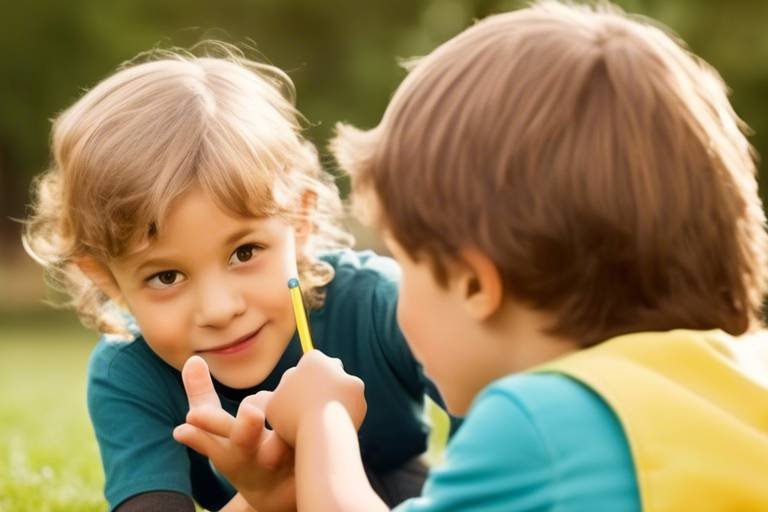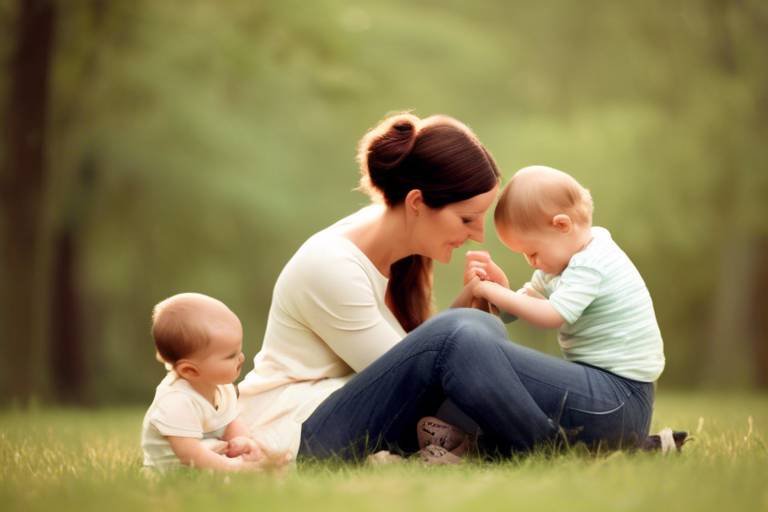Building Social Skills in Your Child
In today's fast-paced world, building social skills in your child is more important than ever. Social skills are the foundation of healthy relationships, emotional intelligence, and effective communication. They enable children to navigate the complexities of social interactions, whether in the playground, classroom, or home. But how can you, as a parent, actively nurture these essential skills in your child? The journey begins with understanding what social skills are and why they matter. From making friends to expressing emotions, social skills are intertwined with nearly every aspect of a child's life.
Think of social skills as the glue that holds relationships together. Just as we need a solid foundation to build a house, children require a strong base of social abilities to thrive in their interactions with others. When children develop these skills early on, they tend to have better mental health, improved academic performance, and a more fulfilling social life. They learn to empathize with others, resolve conflicts, and express themselves clearly, which are all vital for their overall development.
As parents, we play a crucial role in this developmental process. By creating an environment that encourages social interaction, we can help our children practice and enhance their social skills. This may involve arranging playdates, encouraging participation in group activities, or even engaging in discussions about emotions and relationships. The goal is to equip our children with the tools they need to form meaningful connections with others.
Moreover, understanding the different facets of social skills can help us identify areas where our children might struggle. For instance, some children may find it challenging to initiate conversations, while others may have difficulty reading non-verbal cues. By recognizing these challenges early, we can provide targeted support and interventions that will enable our children to overcome these hurdles.
In essence, building social skills in your child is not just about teaching them how to interact with peers; it's about fostering their overall emotional and social well-being. By investing time and effort into this aspect of their development, you are paving the way for a happier, more confident, and socially adept individual.
Understanding why social skills are crucial for children's development can help parents foster these abilities early on, leading to better relationships and improved mental health throughout their lives.
Recognizing signs of social skill deficits in your child is the first step toward providing support. This section discusses common indicators and how to assess your child's social interactions.
Children may face various challenges, such as difficulty in making friends or understanding social cues. Identifying these challenges can help parents tailor their approach to support their child's development.
Shyness and social anxiety can hinder a child's ability to engage with peers. This section offers insights into recognizing these issues and strategies for overcoming them.
Effective communication is vital for social interaction. Here, we explore common communication difficulties children face and how parents can help improve their verbal and non-verbal skills.
Implementing targeted strategies can significantly improve your child's social skills. This section outlines practical activities and exercises to encourage social engagement and interaction.
Role-playing can be an effective way to teach children about social situations. This section discusses how to create scenarios that help children practice and learn appropriate responses.
Engaging children in games and activities designed to promote teamwork and communication can enhance their social skills. This subsection provides examples of fun, interactive games to try.
Facilitating group interactions is essential for social skill development. Here, we discuss ways to encourage your child to participate in group activities, fostering teamwork and cooperation.
Q: At what age should I start teaching my child social skills?
A: It's never too early to start! Social skills can begin developing as soon as your child starts interacting with others, typically around toddler age. Early interventions can set a strong foundation.
Q: What are some signs that my child may be struggling with social skills?
A: Look for signs such as difficulty making friends, avoiding group activities, or struggling to understand social cues. If you notice these behaviors, it may be time to provide additional support.
Q: How can I help my child overcome shyness?
A: Encourage gradual exposure to social situations, praise their efforts, and model positive social interactions. Role-playing can also be a fun way to practice.
Q: Are there specific activities that can help improve my child's social skills?
A: Yes! Activities like team sports, group projects, and even board games can be excellent for building social skills. Look for opportunities that require cooperation and communication.

The Importance of Social Skills
Understanding the significance of social skills in a child's development is crucial for parents aiming to nurture well-rounded individuals. Social skills are not just about making friends; they encompass a range of abilities that help children navigate the complex world of human interaction. From learning how to share and cooperate to understanding non-verbal cues, these skills are foundational for building healthy relationships and fostering emotional intelligence.
Why are social skills so important? Imagine a child who struggles to connect with others. They may feel isolated, leading to a host of issues, including low self-esteem and anxiety. On the flip side, children who possess strong social skills are often more confident, better at resolving conflicts, and more adept at expressing their feelings. They are likely to experience greater academic success and enjoy more fulfilling relationships throughout their lives.
Moreover, social skills play a pivotal role in a child's overall mental health. Research has shown that children with strong social connections tend to exhibit lower levels of stress and depression. They are better equipped to handle life's challenges and are more resilient in the face of adversity. In essence, teaching children how to interact positively with others is an investment in their future well-being.
To illustrate the importance of social skills, consider the following key benefits:
- Enhanced Communication: Children learn to articulate their thoughts and feelings, leading to better understanding in relationships.
- Improved Empathy: Social skills training helps children recognize and respect the feelings of others, fostering compassion.
- Stronger Problem-Solving Abilities: Kids learn to navigate conflicts and find solutions collaboratively.
- Greater Academic Achievement: Socially skilled children often perform better in school due to improved collaboration and communication with peers and teachers.
In summary, social skills are not just an add-on to a child's education; they are a critical component of their overall development. By recognizing their importance and actively working to cultivate these skills, parents can set their children on a path toward successful interactions and lifelong happiness.
Q: What age should I start teaching my child social skills?
A: It's beneficial to start as early as possible. Social skills begin developing in infancy, so engaging with your child in social settings can lay the groundwork for future interactions.
Q: How can I tell if my child is struggling with social skills?
A: Look for signs such as difficulty making friends, avoiding group activities, or struggling to understand social cues. If you notice these behaviors, it might be time to seek support.
Q: Are there specific activities that can help improve social skills?
A: Yes! Activities like role-playing, team sports, and group games can be incredibly effective in teaching children how to interact with others.

Identifying Social Skill Deficits
Recognizing when your child is struggling with social skills is a critical step towards providing the right support. Just like any other skill, social abilities can vary widely among children. Some may breeze through interactions while others might find themselves feeling lost in social situations. So, how can you tell if your child is facing challenges? Look for common indicators that might suggest a need for additional help.
One of the first signs to watch for is difficulty in making friends. If your child often finds themselves on the sidelines during playtime or is hesitant to join group activities, it could indicate a struggle with social engagement. Additionally, observe how they respond to peers. Are they unable to pick up on social cues, such as tone of voice or body language? This inability to read the room can lead to misunderstandings and further isolation.
Another area to consider is your child's comfort level in various social settings. For instance, do they exhibit signs of shyness or social anxiety? If your child often clings to you during social gatherings or expresses a desire to leave early, it’s essential to address these feelings. They might be feeling overwhelmed or fearful of judgment, which can hinder their ability to connect with others.
To help you better identify these social skill deficits, here are some common challenges you might notice:
- Limited eye contact: Children who struggle with social skills may avoid making eye contact during conversations, which can be a sign of discomfort or anxiety.
- Difficulty initiating conversations: If your child rarely starts conversations or struggles to keep them going, it could indicate a lack of confidence in their social abilities.
- Inappropriate responses: Sometimes, children may respond in ways that seem out of place or inappropriate, indicating they might not fully understand social norms.
Assessing your child's social interactions can be done through observation and open conversations. Ask them about their day-to-day experiences with peers and listen carefully to their feelings. You might also consider discussing their interactions with teachers or caregivers, as they can provide valuable insights into your child's social behavior in different environments.
Understanding these signs is vital, but remember that every child develops at their own pace. If you notice persistent challenges, it may be beneficial to seek professional advice. Early intervention can make a significant difference in helping your child build the social skills they need to thrive.
Q: How can I help my child if they are struggling with social skills?
A: Start by engaging them in social activities that interest them, such as team sports or group classes. Encourage playdates with peers to help them practice their skills in a comfortable environment.
Q: When should I be concerned about my child's social skills?
A: If you notice consistent patterns of isolation, anxiety in social situations, or difficulty making friends over several months, it may be time to seek support from a professional.
Q: Are there specific resources available for parents?
A: Yes! Many community centers offer workshops on social skills, and there are numerous books and online resources available that can provide strategies and activities to help your child.

Common Social Skill Challenges
Every child is unique, and just like snowflakes, no two kids face the same challenges when it comes to social skills. However, there are some common hurdles that many children encounter on their journey to building meaningful connections with their peers. Understanding these challenges is crucial for parents who want to provide the right support. For instance, some children may struggle with making friends, while others might have difficulty interpreting social cues. These challenges can manifest in various ways, often leaving parents scratching their heads, wondering how best to help.
One prevalent issue is the fear of social interactions, which can stem from shyness or social anxiety. Imagine a child standing at the edge of a playground, watching other kids play but feeling too nervous to join in. This hesitance can lead to missed opportunities for friendship and social growth. Additionally, some children may not understand the nuances of communication, such as tone of voice or body language, which are essential for developing strong relationships. They might misinterpret a friendly gesture as a sign of aggression, leading to confusion and frustration.
Another challenge is the inability to engage in conversations effectively. This can be particularly evident in children who struggle with turn-taking during discussions or find it hard to maintain eye contact. These communication difficulties can make social interactions feel daunting, causing children to withdraw or become frustrated. It's like trying to dance without knowing the steps—awkward and uncomfortable!
To give you a clearer picture, here are some common social skill challenges that you might observe in your child:
- Difficulty in initiating conversations: Some kids may find it hard to start a chat, leaving them feeling isolated.
- Struggles with empathy: Understanding how others feel can be a tough nut to crack, making it challenging for children to respond appropriately.
- Inability to read social cues: Many children miss out on non-verbal signals, which can lead to misunderstandings.
- Challenges in group settings: Whether it's a classroom or a playdate, some kids may find it hard to fit in or share the spotlight.
As you can see, these challenges can create a ripple effect, impacting not only your child's ability to form friendships but also their overall emotional well-being. The good news is that by recognizing these issues early on, you can take proactive steps to help your child navigate through these social waters. With the right guidance and support, they can learn to overcome these hurdles and thrive in their interactions with others.
Q: How can I tell if my child has social skill deficits?
A: Look for signs such as difficulty making friends, trouble understanding social cues, or reluctance to engage in group activities. If you notice these behaviors consistently, it may be worth exploring further.
Q: What age should I start teaching my child social skills?
A: It's never too early to start! Social skills can be introduced as soon as your child begins to interact with others. Early childhood is a crucial time for developing these abilities.
Q: Are there specific activities that can help improve my child's social skills?
A: Yes! Activities like role-playing, group games, and team sports can significantly enhance your child's ability to interact with peers and develop essential social skills.

Shyness and Social Anxiety
Shyness and social anxiety are two common challenges that many children face, often leading to feelings of isolation and frustration. Imagine walking into a room full of people, your heart racing, palms sweating, and the overwhelming urge to find the nearest exit. This is the reality for many children who struggle with these issues. Understanding the distinction between shyness and social anxiety is crucial for parents. While shyness is often a temporary feeling of discomfort in social situations, social anxiety is a more persistent fear that can significantly impact a child's daily life.
Recognizing the signs of shyness and social anxiety early on can make a world of difference. Children may exhibit various behaviors that indicate they are struggling, such as avoiding eye contact, clinging to parents in social settings, or having difficulty initiating conversations. It's essential for parents to observe these behaviors and approach them with empathy and understanding. After all, a child experiencing social anxiety is not merely shy; they may be battling an internal struggle that feels insurmountable.
So, what can you do as a parent to help your child navigate these feelings? First and foremost, it’s important to create a safe and supportive environment. Encourage open discussions about feelings and fears. Let your child know that it’s perfectly okay to feel anxious and that many others share the same experiences. This validation can be incredibly empowering. Additionally, you might consider introducing gradual exposure to social situations. Start with smaller, less intimidating settings, and gradually increase the complexity as your child becomes more comfortable. This method can help build their confidence over time.
Another effective strategy is to model positive social behaviors. Children often learn by observing their parents, so demonstrating how to engage in conversations, make new friends, or handle social setbacks can provide them with valuable tools. You can also role-play different social scenarios at home, allowing your child to practice responses in a safe space. This practice can help them feel more prepared and less anxious when faced with real-life situations.
Lastly, consider seeking professional help if your child's shyness or anxiety seems severe. A child psychologist or counselor can provide tailored strategies and support that can make a significant difference. Remember, addressing these issues early on can lead to healthier social interactions and improved emotional well-being in the long run. It's not just about helping your child fit in; it's about empowering them to thrive in their social world.
- What is the difference between shyness and social anxiety?
Shyness is a temporary feeling of discomfort in social situations, while social anxiety is a more persistent fear that can affect daily life. - How can I help my child overcome shyness?
Creating a supportive environment, encouraging open discussions, and gradually exposing them to social situations can be effective strategies. - When should I seek professional help for my child's social anxiety?
If your child's anxiety is severe and significantly impacts their daily life, it's advisable to consult a child psychologist or counselor.

Difficulty in Communication
Effective communication is the cornerstone of successful social interactions, yet many children struggle with this essential skill. When a child experiences , it can manifest in various ways, affecting their ability to express thoughts, understand others, and engage in conversations. Imagine trying to navigate a bustling city without a map—this is often how children feel when they lack communication skills. They may feel lost, confused, and frustrated, which can lead to further social isolation.
Common communication difficulties include challenges with verbal skills, such as vocabulary limitations, unclear speech, or difficulty forming sentences. Additionally, non-verbal communication, which encompasses body language, eye contact, and facial expressions, plays a significant role in how children convey their feelings and intentions. A child who avoids eye contact may come across as disinterested or shy, even if they are eager to participate in conversations. This miscommunication can lead to misunderstandings and missed opportunities for connection.
To help your child overcome these hurdles, it's essential to create a supportive environment that encourages open dialogue. Here are some effective strategies:
- Model Good Communication: Children learn by observing. Engage in conversations with them that demonstrate active listening and clear expression.
- Practice Turn-Taking: Use games that require turn-taking, such as board games or card games, to teach the rhythm of conversation.
- Encourage Storytelling: Prompt your child to tell stories about their day. This not only builds vocabulary but also improves their ability to structure thoughts coherently.
Moreover, it's crucial to recognize that every child is unique. Some may need more time to develop these skills, while others might require professional support. If you notice persistent difficulties, consider consulting with a speech-language pathologist who can provide tailored strategies and interventions. Remember, the goal is to empower your child with the tools they need to navigate their social world confidently.
In conclusion, addressing communication difficulties early on can significantly enhance your child's social interactions and overall emotional intelligence. By providing the right support and encouragement, you can help them transform their communication challenges into opportunities for growth and connection.
Q: What are some signs my child may have communication difficulties?
A: Signs can include trouble expressing thoughts clearly, limited vocabulary, difficulty following conversations, or challenges in understanding non-verbal cues.
Q: How can I support my child at home?
A: Engage in regular conversations, read together, encourage storytelling, and practice role-playing different social scenarios.
Q: When should I seek professional help?
A: If your child consistently struggles with communication despite your efforts, or if their difficulties affect their self-esteem or social interactions, it may be time to consult a professional.

Strategies for Enhancing Social Skills
Enhancing your child's social skills can feel like embarking on a grand adventure—one that requires patience, creativity, and a sprinkle of fun! The journey begins with understanding that social skills are not just innate traits; they can be nurtured and developed over time. So, how can you equip your child with these essential tools for navigating the social landscape? Let's dive into some effective strategies that can make a significant difference in your child's ability to connect with others.
One of the most engaging methods for enhancing social skills is through role-playing. Think of it as a rehearsal for real-life interactions. By creating various social scenarios, you can help your child practice responses and behaviors in a safe environment. For instance, you might set up a scene where they have to introduce themselves to a new classmate or ask to join a game during recess. These practice sessions not only boost confidence but also allow children to explore different social dynamics without the pressure of actual consequences.
Another fantastic strategy is to incorporate games and activities that promote teamwork and communication. Board games, team sports, and even simple group activities can provide your child with opportunities to interact with peers, learn about cooperation, and develop problem-solving skills. For example, games like “Capture the Flag” or “Duck, Duck, Goose” require children to communicate and work together, fostering a sense of community and shared goals. Plus, they’re just plain fun!
Encouraging group interactions is also essential. As parents, you can facilitate opportunities for your child to engage with others by organizing playdates, joining clubs, or participating in community events. By immersing your child in diverse social settings, you help them learn to adapt to different social cues and behaviors. It's like giving them a front-row seat to the social world, where they can observe, learn, and practice in real-time.
Additionally, consider incorporating structured social skills training into your routine. There are numerous resources available, including workshops and classes designed specifically for children. These programs often use interactive methods to teach skills like empathy, active listening, and conflict resolution. Your child can benefit immensely from the guidance of trained professionals who can provide tailored feedback and support.
Lastly, don’t underestimate the power of modeling behavior. Children are like sponges, soaking up the actions and attitudes of the adults around them. By demonstrating positive social interactions—such as how to greet someone, ask for help, or share—you're providing a living example for your child to emulate. Engage in conversations with your child about your social experiences, discussing both successes and challenges. This dialogue not only reinforces learning but also strengthens your bond.
In summary, enhancing your child's social skills is a multifaceted process that combines practice, engagement, and modeling. Whether through role-playing, games, or structured training, each strategy plays a vital role in equipping your child with the necessary tools to thrive in their social world. Remember, the more opportunities your child has to practice these skills, the more confident and capable they will become in building meaningful relationships.
Q: At what age should I start teaching my child social skills?
A: It's never too early to start! Social skills can begin to develop as soon as your child starts interacting with others. However, structured teaching can be particularly effective around ages 3 to 7, as children are beginning to understand social norms.
Q: What if my child is shy and reluctant to engage in social activities?
A: Start small. Encourage low-pressure interactions, such as inviting one friend over for a playdate. Gradually increase the complexity of social situations as your child becomes more comfortable.
Q: How can I tell if my child is struggling with social skills?
A: Look for signs such as difficulty making friends, trouble understanding social cues, or frequent conflicts with peers. If you're concerned, consider seeking advice from a professional.
Q: Are there any specific games that can help improve social skills?
A: Yes! Look for games that require teamwork, such as “The Game of Life,” “Pandemic,” or cooperative board games. These games encourage communication and collaboration.

Role-Playing and Social Scenarios
Role-playing is an incredibly effective method for helping children navigate the often complex world of social interactions. Think of it as a dress rehearsal for life! By stepping into different roles, children can practice various social scenarios in a safe and controlled environment. This approach not only enhances their understanding of social cues but also builds their confidence in handling real-life situations. Imagine your child as a little actor, learning to express emotions, read body language, and respond appropriately—all while having fun!
To get started with role-playing, parents can create a variety of social scenarios that children might encounter. For example, you could simulate a birthday party, where your child has to greet guests, share toys, or even manage a small conflict over a game. Each scenario can be tailored to address specific challenges your child faces, making the practice both relevant and engaging. Here are some ideas for scenarios:
- Meeting new friends at school
- Handling a disagreement with a peer
- Asking someone to join a game
- Expressing feelings when upset
These role-playing exercises can be made even more exciting by incorporating props or costumes, which can help stimulate your child's imagination and make the experience feel more real. For instance, using a toy phone can help them practice making a call to invite a friend over, or wearing a hat can signify a new character they are portraying. The key is to encourage your child to express themselves freely and explore different outcomes based on their responses.
Moreover, role-playing can also be a great way to introduce the concept of empathy. By putting themselves in someone else's shoes, children can learn to understand and appreciate different perspectives. This not only enriches their social skills but also enhances their emotional intelligence, making them more attuned to the feelings of others. After each role-play session, take a moment to discuss with your child what went well and what could be improved. This reflection can solidify their learning and encourage them to think critically about their interactions.
Incorporating role-playing into your child's routine doesn't have to be a chore. It can be as simple as transforming a mundane day into a playful learning opportunity. Whether you're waiting in line at the grocery store or enjoying a quiet evening at home, seize the moment to engage in a quick role-play exercise. Not only will this help your child develop essential social skills, but it will also create lasting memories and strengthen your bond as a family.
Q: How often should we practice role-playing?
A: It's beneficial to incorporate role-playing into your weekly routine. Even a few minutes several times a week can make a significant difference.
Q: What if my child is resistant to role-playing?
A: Start small and make it fun! Use their favorite characters or games to ease them into the activity. It's all about creating a comfortable environment.
Q: Can role-playing help with shyness?
A: Absolutely! Role-playing can help shy children practice social interactions in a low-pressure setting, gradually building their confidence.
Q: Should I guide my child during role-play?
A: While it's important to provide guidance, allow your child to lead the scenario. This fosters independence and creativity in their social responses.

Games and Activities
When it comes to enhancing your child's social skills, can be a powerful tool. They not only provide a fun way for children to engage with their peers but also create opportunities for learning essential social cues and teamwork. Think of these activities as a playground for social growth, where your child can practice and refine their interpersonal skills in a safe environment. The goal is to create a balance between fun and learning, ensuring that your child is not just playing, but also developing critical social competencies.
One effective way to foster these skills is through cooperative games. Unlike competitive games that can sometimes lead to conflict or anxiety, cooperative games encourage children to work together towards a common goal. For instance, games like “The Human Knot” or “Capture the Flag” require players to communicate, strategize, and collaborate. These activities not only teach children how to express their ideas and listen to others but also help them understand the importance of teamwork. Imagine your child, once shy and reserved, now leading a team to victory in a game that requires everyone to contribute!
Additionally, incorporating role-playing activities can be incredibly beneficial. By simulating real-life situations, children can practice their responses to various social scenarios. For example, you might set up a pretend grocery store where your child can take turns being the cashier and the customer. This not only helps them learn how to interact with others but also boosts their confidence in social settings. The beauty of role-playing is that it allows children to make mistakes in a safe space, learn from them, and try again. It’s like giving them a rehearsal for the grand performance of life!
Another fun approach is to engage your child in art and craft activities that require teamwork. Projects like building a model or creating a mural can be a fantastic way for children to collaborate. These activities foster discussion, negotiation, and compromise, which are all key components of effective social interaction. Plus, the satisfaction of completing a project together can strengthen their bond with peers, making them more likely to seek out social interactions in the future.
To give you a clearer idea of how to implement these activities, here's a quick table of examples:
| Activity | Skills Developed |
|---|---|
| Cooperative Games (e.g., Human Knot) | Teamwork, Communication |
| Role-Playing Scenarios | Empathy, Problem-Solving |
| Art Projects (e.g., Group Mural) | Creativity, Collaboration |
| Board Games (e.g., Pictionary) | Turn-Taking, Social Cues |
Incorporating these games and activities into your child’s routine can transform their social interactions from daunting to delightful. Remember, the key is to keep the atmosphere light and enjoyable. When children are having fun, they are more likely to engage, learn, and grow. So, next time you’re looking for an activity, consider how it can double as a social skills lesson. After all, every game played is a step towards building a more confident and socially adept child!
Q: How often should I engage my child in social skill-building activities?
A: Ideally, you should incorporate these activities into your child's routine several times a week. The more practice they get, the more comfortable they'll become in social situations.
Q: What if my child is resistant to participating in group activities?
A: Start small! Encourage participation in one-on-one settings or smaller groups before gradually introducing larger groups. Make sure to choose activities that align with their interests to spark their enthusiasm.
Q: Are there specific age-appropriate games for different age groups?
A: Yes! Younger children might enjoy simple cooperative games, while older kids can handle more complex role-playing scenarios or strategy-based games that require teamwork.

Encouraging Group Interactions
Encouraging group interactions is a vital component in helping your child develop robust social skills. Think of it as planting seeds in a garden; the more you nurture those seeds, the more they will grow and flourish. Group activities provide children with opportunities to practice communication, collaboration, and empathy, which are essential for building strong relationships. But how can you effectively encourage your child to engage in these interactions? Here are some strategies that can help.
First, consider enrolling your child in team-based activities or clubs that align with their interests. Whether it's a sports team, a drama club, or a science group, these settings naturally foster teamwork and allow children to learn from one another. For instance, if your child loves soccer, joining a local team can provide them with a platform to interact with peers while working towards a common goal. This not only enhances their social skills but also builds their confidence.
Additionally, you can organize playdates or group outings with friends. This doesn’t have to be a grand event; simple activities like visiting a park, having a picnic, or even a movie night can create a relaxed atmosphere where your child feels comfortable interacting with others. The key is to encourage open communication during these outings. Ask your child questions about their experiences and feelings, which can help them reflect on their interactions and learn from them.
Moreover, teaching your child the importance of sharing and taking turns can significantly improve their group interaction skills. You can do this through engaging games that require cooperation. For example, board games that necessitate teamwork can be both fun and educational. These games not only teach the value of collaboration but also help children understand how to handle winning and losing gracefully.
It's also essential to model positive social behaviors yourself. Children often learn by observing adults, so demonstrating effective communication and active listening in your interactions can set a powerful example for them. When your child sees you engaging positively with others, they are more likely to mimic those behaviors in their own social situations.
Lastly, encourage your child to express their feelings and thoughts openly. Creating a safe space for them to share their experiences will empower them to communicate better with their peers. You might say something like, "How did you feel when you played with your friends today?" This not only helps them articulate their emotions but also fosters deeper connections with others.
In summary, encouraging group interactions is about creating opportunities and environments where your child can thrive socially. By engaging in team activities, facilitating playdates, teaching sharing, modeling behavior, and encouraging open communication, you can help your child develop the essential skills they need to navigate their social world confidently.
- What are some signs that my child needs help with social skills? Look for signs such as difficulty making friends, avoiding group activities, or showing signs of anxiety in social situations.
- How can I help my shy child become more social? Start with small group interactions and gradually increase the size of the groups as they become more comfortable.
- Are there specific games that promote social skills? Yes, games that require teamwork, communication, and problem-solving, such as charades or cooperative board games, can be very effective.
Frequently Asked Questions
- Why are social skills important for my child's development?
Social skills are essential for children as they help them navigate relationships and build connections with peers. These skills enhance emotional intelligence, leading to better communication and problem-solving abilities. When children learn to interact positively with others, they are more likely to develop healthy friendships and cope with challenges effectively.
- How can I identify if my child has social skill deficits?
Look for signs such as difficulty making friends, avoiding social situations, or struggling to understand social cues. If your child often seems confused in group settings or has trouble expressing their feelings, these may be indicators of social skill challenges. Observing their interactions with peers can provide valuable insights into their social capabilities.
- What are some common challenges children face regarding social skills?
Children may experience challenges like shyness, social anxiety, or trouble communicating effectively. They might find it hard to read body language or facial expressions, leading to misunderstandings in social situations. Recognizing these challenges allows parents to tailor their support and encourage their child's growth in these areas.
- How can role-playing help my child improve their social skills?
Role-playing allows children to practice social scenarios in a safe environment. By acting out different situations, they can learn appropriate responses and develop confidence in their interactions. This method helps them understand social dynamics and prepares them for real-life situations, making them more comfortable when engaging with others.
- What types of games can promote social skills in children?
Games that require teamwork, communication, and problem-solving are excellent for enhancing social skills. Examples include cooperative board games, team sports, and group challenges. These activities encourage children to work together, share ideas, and develop a sense of belonging, all of which are crucial for building social competence.
- How can I encourage my child to participate in group activities?
Start by introducing your child to small group settings where they feel comfortable. Gradually increase the size of the group as they gain confidence. Encourage participation by highlighting the fun aspects of group activities and praising their efforts. Creating a supportive environment helps children feel secure, making them more likely to engage with others.


















